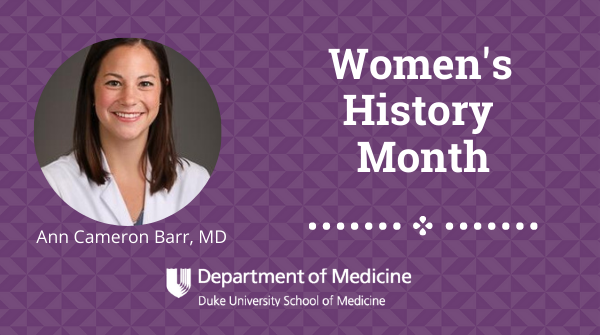
Ann Cameron Barr, MD is currently a third-year resident in Internal Medicine. She will join the division of Rheumatology as a first-year fellow in July 2022 and will serve as Chief Resident for Duke Regional Hospital and Ambulatory Medicine during the 2023-2024 academic year.
By Ann Cameron Barr, MD
I was extremely fortunate to grow up in a household with two physician parents, and I was lucky to have many strong female role models in my life from a young age. Despite the stereotype of working dads and stay-at-home moms that dominated my childhood, my mother showed me it was possible to have a career and be a present mother. I didn’t have to choose. In fact, I distinctly remember the pride I felt throughout grade school when my friends’ parents would bring their sick kids by our house after hours. It was my mom they came to for help, and I thought that was pretty darn cool.
I certainly benefited from not only having a physician as a mom but also being raised in a two-physician household. Not infrequently, I remember being asked by adults if I was going to be a doctor when I grew up, just like my parents. I was only ever mildly interested at the time, but because of these childhood experiences, I had not doubted it as a possibility.
In college, I briefly considered a major in Mathematics before ultimately majoring in Economics. I quickly found that classrooms in both departments were dominated by men, and I remember well the feelings of surprise and of privilege I had—the realization that many young women are not exposed to or encouraged to pursue STEM fields the way I had been. I joined a club called GEMS, Girls Excited About Math and Science, which was dedicated to bridging the gender gap in STEM fields by hosting science experiments in local middle schools.
When I started medical school in 2015, I showed up on day one to a lecture hall filled with women. In fact, 60% of our class was female. After growing up hearing the horror stories of my mother’s medical training in the late 1970s, I was so excited and optimistic for how much better my experience would be. My experience truly was much better, and I felt very supported during my time in medical school. However, though the openly sexist comments my mother experienced on a daily basis 40 years before were much less frequent, they were still clearly present. My female classmates and I all had stories of inappropriate comments made about our physical appearance or advice given on “suitable specialty choices” for our gender, and I even recall an attending lecturing on rounds about how women could not be trusted to make decisions while menstruating and, thus, should not be physicians.
Despite all the positive changes, it was clear to me we still had a long way to go, and when I started interviewing for residency programs, I paid close attention to the culture of each program and institution. Fast-forward to my interview at Duke. I distinctly remember sitting in the Med Res Library where residency leadership physically showed up to introduce themselves to applicants. Among these leaders was a female Program Director (Aimee Zaas) and Associate Program Director (Dani Zipkin), at least one female Chief Resident (Jenny Van Kirk), and a female Chair (Kathleen Cooney). These are the faces I remember. I remember Dr. Zaas telling stories about her love for medicine, her husband, and her kids. I remember thinking: this is the place I want to be.
Over the last two and a half years, I’ve felt the support of a network of women (and those who support women) in medicine. I’ve been fortunate to have amazing female mentors, from Lisa Criscione-Schreiber (who talked career advice with me over the phone before I’d even made my residency match list) to Suchita Sata (without whom I could never have started Duke’s Virtual Resident Teaching competition, Duke It Out!) to Kai Sun (who has mentored me through just about every step of a clinical research project), just to name a few. I’ve also had the opportunity to offer to others the same support I’ve received, both informally to medical students and other residents and more formally through the Department’s pipeline program with Durham’s City of Medicine Academy High School.
I am also truly grateful to the members of this department who show their support for people of all genders, races, and ages by standing up for each other and calling out disrespect. As an intern, I recall one particular instance rounding at the VA with my JAR (also female) and our male attending. After peppering us with sugars, sweethearts, and honeys, the patient (who my co-resident and I had seen every day for a week) shoved his water jug at us to refill “while he talked to the doctor.” Without skipping a beat, our attending took the water jug, reminded the patient that all three of us were physicians, and stated he would be happy to grab the patient a refill while his primary doctors examined him. I think it is these small moments of solidarity that help create a more immediate shift in our culture towards inclusivity. Let’s all continue standing up for one another.
We’ve come a long way from the stories I heard growing up, and yet, we still have a long way to go. These experiences have highlighted for me the importance of representation, mentorship, sponsorship, and feeling a sense of safety and belonging. They’ve affected my approach to mentorship of others. They’ve reminded me that sometimes we need a little push of encouragement and that doesn’t make us any less capable. It is both the progress we’ve made and the challenges we have left to tackle that motivate me now as a resident (soon fellow) and in my future role as a chief resident. To quote the great Dr. Kimberly Manning, “support is a verb.”